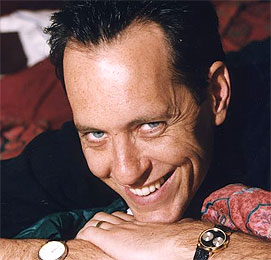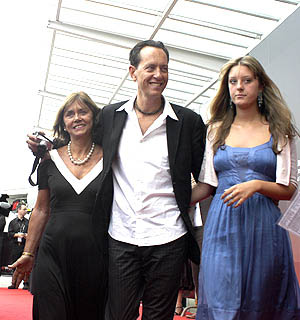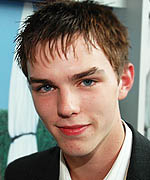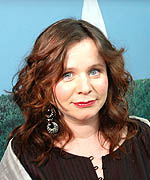August14
Scotland On Sunday – Sunday 14th August, 2005

Richard E Grant received some invaluable support from Withnail writer and director Bruce Robinson.
By Allan Hunter.
Picture: Adam Elder
Richard E Grant would be the first to admit that he has had an unconventional career. Few British actors have worked with such an abundance of international filmmaking luminaries, including Martin Scorsese, Robert Altman, Francis Ford Coppola, Tim Burton and Jane Campion. Even fewer can boast a filmography that also includes Spice World: The Movie, The Little Vampire and Killing Dad. Golden greats rub shoulders with golden turkeys in a body of work that suggests a man restless for fresh challenges and game for absolutely anything.
It is 20 years since Grant first burst on the film scene in Withnail & I. His beanpole frame, manic manner and flared Kenneth Williams nostrils guaranteed him instant cinematic immortality as the awesomely dissolute thespian in the cult favourite. Now, at 48, he has just emulated the career path of Withnail creator Bruce Robinson by making the move from actor to director. It may be the greatest challenge of his career and it feels like a new beginning for him.
His directorial debut Wah-Wah is a beautifully made autobiographical drama set in Swaziland during the late 1960s and early 1970s, and charts a young boy’s accelerated coming of age against the last gasp of the British Empire. Sharply observed, warm-hearted and confidently handled, it casts a generous eye over the joys and sorrows of the boy’s life as he is caught in the crossfire of his parents’ volatile relationship. An excellent ensemble cast includes Gabriel Byrne as the father, Miranda Richardson as the mother, Julie Walters as Aunt Gwen, Emily Watson as the stepmother Ruby and Nicholas Hoult as the Grant character Ralph.
Grant was born in Mbabane in Swaziland in 1957, where his father was the last minister for education before the country’s independence from Britain in 1968. The film is a lightly fictionalised account of his own experiences living under the tyranny of his father’s alcoholism and the stigma of his parents’ divorce.
It is a shade after 8am on a Saturday but Grant is remarkably chipper. Courteous and thoughtful in his responses, he seems genuinely touched by the enthusiasm which the film’s world première in Edinburgh has met.
“Everything happened but it has been reconfigured for the film. Independence happened in 1968,” he says, “but my story only starts in 1969. Princess Margaret wasn’t the one who handed the country back to the Swazi King; it was Princess Alexandria in 1968, but Princess Margaret came in 1980 and did leave halfway through a performance of a show claiming she had stomach trouble.
“A production of Camelot was done and I was in it in 1975. My father died in 1981 when I was 24. So, it is 15 years boiled down and concentrated into something that happens over three years. There is a concertinaing and a rejigging of the chronology of events to try to make some kind of cohesive narrative which real life doesn’t fit quite so succinctly.”
Events may have been shaped to fit the contours of a film script, but the emotional truth of the situations is vividly authentic. Grant recalls the Swaziland of that period as almost a time warp country enthralled to the repressive values of 1950s England rather than the sexual and social revolution of the swinging Sixties. Divorce was treated like a disease that might be contagious and alcoholism was never acknowledged in polite company.
Surface appearances and stiff upper lip stoicism were prized above all. Is it a childhood he can recall with any sense of affection? “My feelings are very mixed,” Grant says. He has given much thought to the past during the production of this film and seems to find talking about it a further form of confessional. “It was tortuous on one side because the nature of my father’s alcoholism was so violent. His character was so transformed by night. He was so charming and funny and loving by day that it felt at the time and in retrospect like a schizophrenic life.
“Even though people drank a lot and the majority of people whose parents I knew were having affairs, my father was very restrained in his drinking in public so everything happened behind closed doors. I was also the only kid whose parents actually got divorced and the stigma of that seemed much more acute.”
In the film, the character of Grant’s father is played by Gabriel Byrne. Byrne has forged a close link with the plays of Eugene O’Neill on stage and there is almost a whiff of the father from Long Day’s Journey Into Night in his performance in Wah-Wah. The actor’s natural charm makes the figure seem much more tragic than villainous. It is a film that never judges. Byrne’s portrayal of the father is fond and loving but under the influence of alcohol he also produces a gun and you’re left in no doubt that he could potentially shoot his son dead. This incident was reality for the adolescent Grant.
“Obviously that was horrifying at the time,” he admits. “I knew that my father was roaring drunk and that he never meant it, and because you love someone you forgive them. When my father was dying, he told me that he never stopped loving my mother. I said, ‘Do you mean my stepmother?’ and he could barely talk because of this wretched brain tumour but he said, ‘Your mother’.
“It literally felt like a bomb going off in my face because I understood everything that had happened to him. He had no control over the unrequited love he had for my mother. After they split up, relations had been extremely acrimonious – they never saw each other face to face again after she left. When I heard him say that, he had just explained to me why he had turned to alcohol to try to numb the impact of all of that. It suddenly all seemed to make sense.”
In the film, Grant’s alter ego is forced to grow up quickly and face the kind of responsibilities that even an adult might resent. He witnesses his mother’s adultery, faces her abandonment, the unexpected arrival of a new stepmother into his life and so much more. It seems impossible to imagine someone emerging from this life without permanent scars. Grant seems remarkably well adjusted, a suggestion he greets with a laugh.
“You are forced into parenting your own parent, so I suppose that means you have to leapfrog into being more responsible and mature at an age that you shouldn’t be,” he says. “I suppose that’s really what happened to me.”
He has come to terms with everything but still seems to think he could have done more. “In retrospect I wonder if it would have made a difference if I’d tried to seek help for my father. In the film there is a moment when I go to consult the local doctor about my father and he says, no matter what happens, nobody must know about this.”
Grant moved to Britain in 1982 and by the 1990s was in Hollywood working on films such as the notorious Hudson Hawk with Bruce Willis, L.A. Story with his friend Steve Martin, Robert Altman’s The Player and Martin Scorsese’s The Age of Innocence.
When he was 40 and working in Los Angeles, he attended some AA meetings for the relatives of those who suffer from alcoholism and found comfort in the sharing of common experiences.
His mother and stepmother are still alive and living in Africa and were both given a copy of the Wah-Wah screenplay to read before he made public the family’s history. “That was about four years ago and it was a big test,” he says. “They both felt that it wasn’t judgmental and was a pretty accurate reflection of what went on. They haven’t seen the film yet so that’s the next test. It has been a kind of exorcism, and in telling the most personal story you hope to reach people. If it comes from the heart it goes to the heart.”
Grant has never attended film school but 20 years of working with some of the best in the business have provided him with a wealth of experience and a vast pool of support. One of those he turned to for advice was his good friend Peter Capaldi, the Scots actor and director who directed him in the Oscar-winning short Franz Kafka’s It’s A Wonderful Life and his feature debut Strictly Sinatra.
“I’ve known Peter for 23 years. He was incredibly encouraging and supportive to me. We e-mailed each other every day during the making of the film and he warned me about all the troughs and lows during the editing and casting and so on. He was incredibly helpful.”
Grant also received some invaluable support from Withnail writer and director Bruce Robinson, who also directed Grant in How to Get Ahead in Advertising. “Withnail was also an entirely autobiographical story and so he gave me two things. He said that no scene can happen in the film that doesn’t happen from the boy’s point of view and that you must always stop and think in the story, ‘What has happened today that has never happened before?’
“The moment he said that I knew the film had to start in the car with the mother’s adultery being witnessed by the boy and so that gave a beginning to the film. There isn’t a scene in the film without the Ralph character, even if he was hearing it through a door or spying on someone. There is no scene that happens that he was not present for, which I found really helpful. It prevents you from getting sidetracked. There are so many characters I remember so vividly from living in Swaziland I could have written a Short Cuts 10 times over.”
Grant admits to having been full of trepidation about how he might handle the technical aspects of filmmaking, confessing that he only scored 9% in his mock O-level maths in 1973 and claiming he has no aptitude for camera lenses, angles or film stocks. The finished film betrays no sign of such worries and is a remarkably assured debut that confidently handles the changes in emotional gears, from the social satire of an Alan Bennett to the guilt-ridden agonies of a Graham Greene. It is a film that manages to be funny and touching, true to itself yet embodying the kind of experiences that have a universal truth.
After the Edinburgh world première this Wednesday, there will be a North American première in Toronto on September 12. The film has still to secure a distribution deal, but once word starts to emerge from Edinburgh, that is surely a formality. Grant has already moved on to fresh challenges, appearing in the forthcoming television reality series with the far from promising title of Celebrity Shark Bait alongside Ruby Wax and Colin Jackson.
“We never knew it was going to be called that,” he says, a trifle defensively. “I’ve been a scuba diver for as long as I can remember and have been obsessed with sharks for as long as I can remember. When they said, will you go on this programme, go in a cage off the coast of Cape Town to be in the closest proximity you can be in a safe environment to great white sharks, I leapt at it. It was simply irresistible.”
Grant’s next move will be completing an acting role in a tale of the pilots who flew hurricane bombers from Newfoundland to Britain to provide vital supplies over the winter months in the darkest days of the Second World War. It seems hard to imagine that just acting will be enough to satisfy him in the future and he says he would love to direct another film after Wah-Wah has been launched.
“As an actor you have to have tunnel vision,” he says. “You force yourself to only see the character’s point of view because things get muddied or generalised otherwise. In writing and directing a film, it feels like 360 degrees. I love being asked questions about what colour should this be, where should I move, how do I do that and where do we put the camera. I found that much more stimulating, and exhausting, but all-embracing, in a way that acting never has been to me.”
Wah-Wah opens the Edinburgh International Film Festival this Wednesday. Public screenings are on Wednesday, 9pm and 9.30pm, Cineworld, Edinburgh; Richard E Grant will give a Reel Life Interview, Thursday, Cineworld, 5pm. Tickets can be ordered at www.edfilmfest.org.uk or by calling 0131-623 8030
 The REG Temple is the official website for actor, author and director Richard E. Grant.
The REG Temple is the official website for actor, author and director Richard E. Grant.




















